Man Demands That His Wife Get Rid Of The Cats He Agreed To Get, Wife Refuses, And Redditors React
For cat lovers, there is no question that having cats is good for our mental health; the whiskers, fuzzy faces, meows, and head nudges tell us as much. But the rest of the world still needs to catch up, as those without cats are missing out on the charm of cats.
Adopting a cat is akin to adopting a stress reliever that walks, meows, and is snarky. Cats have been found to reduce stress in a variety of ways.
After a challenging day, spending time cuddling a fluffy cat can help your body release hormones that reduce stress. Your heart rate, blood pressure, and anxiety levels go back to normal when you do this.
The sense of connection that comes with owning a cat and how that bond enhances mental health are extra benefits. Having a cat can give people purpose and alleviate feelings of loneliness.
Positivity in mental health can increase when an animal responds to you in such a straightforward and unadulterated way, relies on you, and loves you. The narrator of today's story has a partner who encouraged her to adopt a cat.
She did, and it's helped her out with a lot of mental health struggles. It got to a point where the OP asked her partner if she could adopt another cat, and he agreed, but after they got married, things changed.
Apparently, the partner's father wanted the cats gone, and the OP's partner insisted she get rid of the cats.
So now, the original poster is asking...

The OP asked him many times if he is okay with her keeping her cats
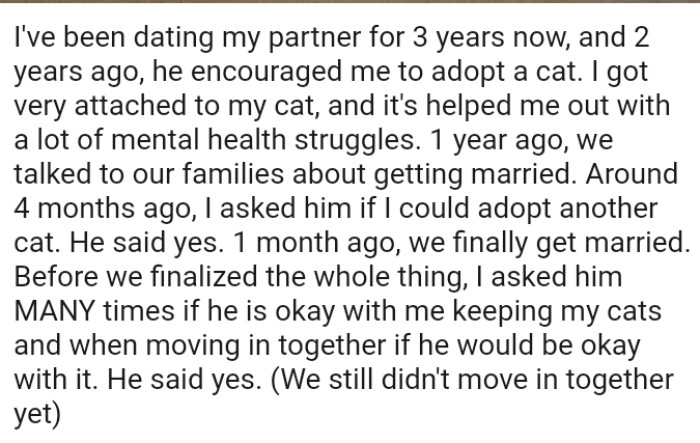
OP did ask if he was okay with her cats pre-finalizing the marriage and he said yes
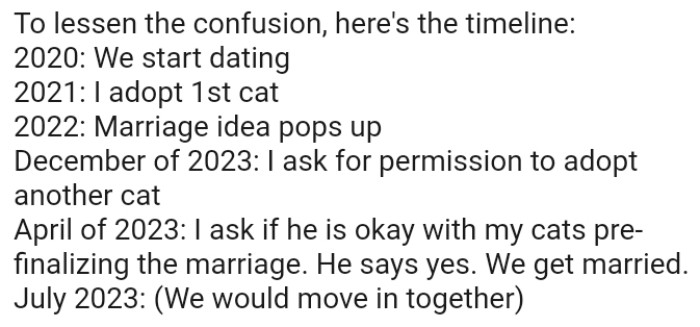
Exploring Relationship Dynamics
This case reveals the complexities of marital dynamics, particularly when it involves shared responsibilities like pet ownership. Dr. John Gottman's research on relationships indicates that conflicts surrounding shared responsibilities can often stem from deeper issues of trust and communication. The husband's demand for his wife to get rid of the cats could reflect his feelings of being overwhelmed or unsupported in the relationship.
Studies show that unresolved conflicts regarding shared responsibilities can lead to increased tension and resentment, which can undermine the overall health of the relationship.
Understanding the Dynamics of Joint Pet Ownership
Dr. Mia Roberts, a family psychologist at University of Chicago, underscores the complexity of joint pet ownership.
She notes that pets often serve as emotional anchors in relationships, but differing views on their care can lead to significant conflicts.
Research shows that disagreements over pet responsibilities can reflect deeper issues in the partnership, such as communication styles and conflict resolution strategies.
In this case, exploring the underlying motivations behind the husband's demands may uncover areas for growth in their relationship.
Exploring Commitment and Responsibility
Dr. Rachel Smith, a marriage and family therapist, discusses how shared responsibilities can lead to conflicts in relationships.
Research shows that when partners agree to take on certain commitments, deviations from those agreements can lead to feelings of betrayal and resentment.
This situation highlights the importance of revisiting agreements and communicating openly about expectations in relationships.
OP told him that she did ask before marrying him if he would be okay with it
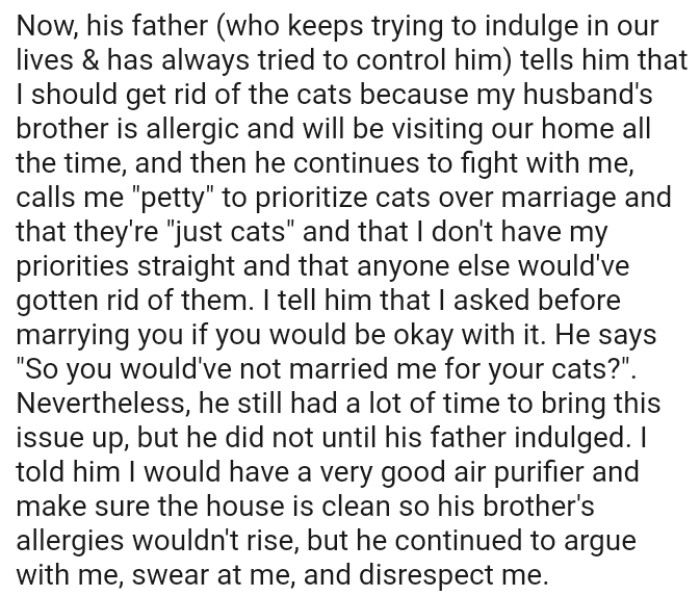
OP just wants to know if she's being stubborn over the right thing
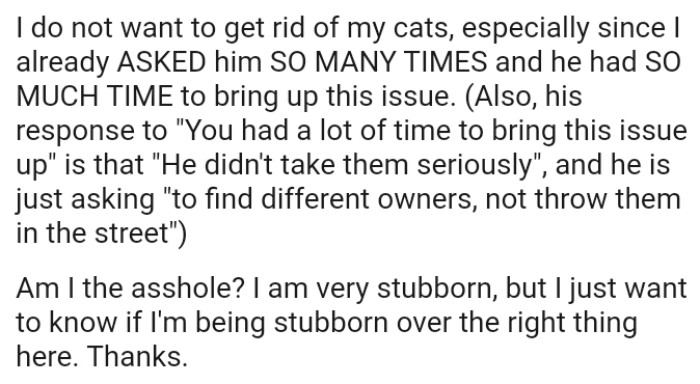
The OP made sure to pay the cat tax
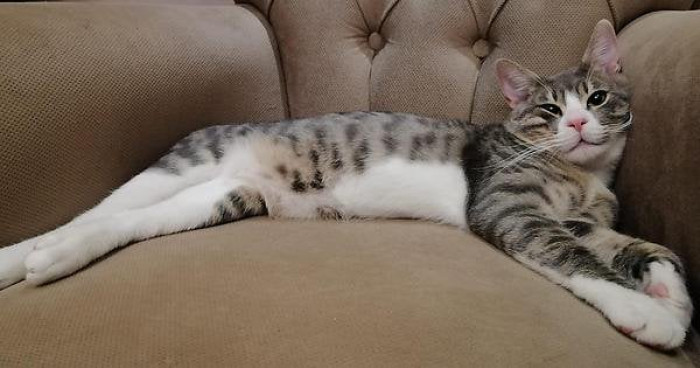
From a psychological standpoint, this situation may also highlight differing values regarding pet ownership. Dr. Hal Herzog’s research on human-animal relationships suggests that individuals often project their emotional needs onto their pets. For the wife, the cats may represent companionship and emotional support, while the husband may view them as added stressors.
This discrepancy in values can lead to significant conflict, as both partners may feel their needs are not being met. It’s essential for couples to explore these underlying values to foster understanding and connection.
Relationship experts highlight the role of compromise in maintaining harmony in partnerships.
When one partner feels strongly about an issue, it's essential for both to engage in open discussions about their feelings and needs.
Studies suggest that couples who practice active listening and empathy during disagreements are more likely to find mutually satisfactory solutions.
Encouraging dialogue about the cat's ownership can help both partners feel validated in their concerns.
A psychologist specializing in attachment theory notes that these conflicts often stem from differing attachment styles.
Studies indicate that individuals with secure attachments are more likely to communicate their needs effectively, while those with insecure attachments may struggle, leading to misunderstandings.
Understanding each other's attachment styles can provide insight into these conflicts and promote healthier communication.
Here are a bunch of the top comments from other Redditors in response to the story above

This Redditor says that this is a hill they would die on

This Redditor suggests the OP should throw him to the streets
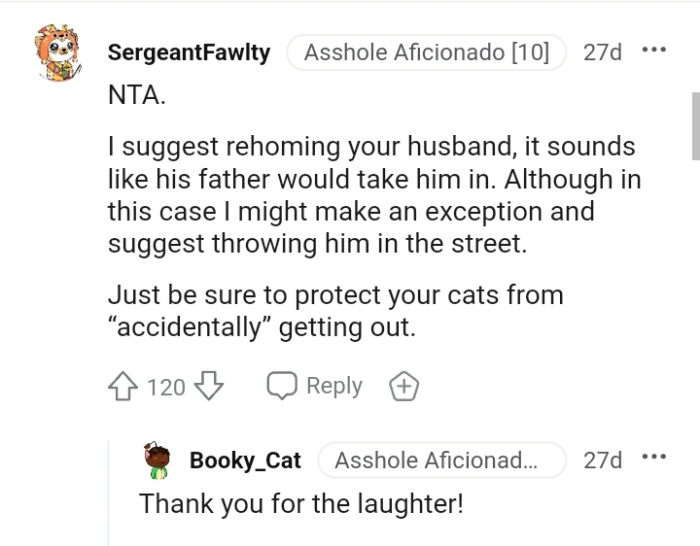
Strategies for Effective Communication
To navigate these conflicts, it’s crucial for both partners to engage in open dialogue about their feelings and needs. Dr. Susan Johnson’s Emotionally Focused Therapy emphasizes the importance of expressing vulnerable emotions rather than focusing solely on the problem. For example, the husband could express his feelings of being overwhelmed, while the wife could articulate her attachment to the cats.
Research shows that couples who practice open and empathetic communication can significantly reduce conflict and enhance relational satisfaction. Establishing regular check-ins can help both partners feel heard and valued.
The Emotional Attachment to Pets
Research from Dr. Alexandra Solomon, a renowned relationship expert, highlights that "pets can serve as a source of emotional support, fulfilling deep-seated needs for companionship." When individuals face the prospect of losing a pet, it often triggers intense feelings of abandonment and insecurity. Understanding this emotional bond is vital for couples as they navigate their differing views on pet ownership. By acknowledging the importance of the cat in their lives, partners can foster greater empathy and understanding.
Communication Strategies for Couples
Experts recommend employing nonviolent communication techniques to address issues of responsibility in relationships.
By focusing on expressing feelings rather than accusations, couples can foster a more constructive dialogue around their expectations and commitments.
Research supports that using 'I' statements can significantly reduce defensiveness and promote understanding.
The OP should get her cats chipped just in case

The OP says that it's easier said than done

It sounds like it was no problem until the partner's dad brought it up
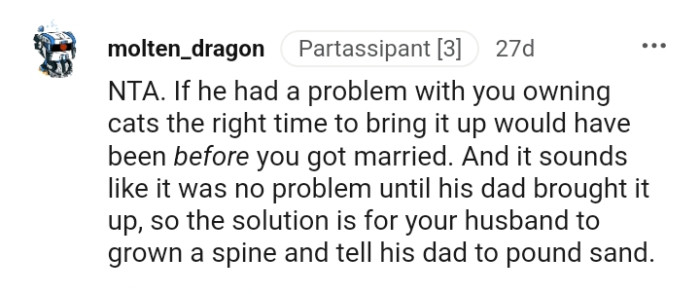
Experts recommend creating a shared vision for pet ownership to resolve conflicts like this.
Engaging in discussions about each partner's values and priorities regarding the pet can help establish common ground.
Additionally, writing down a shared agreement about responsibilities and expectations can provide clarity and reduce misunderstandings.
This proactive approach can foster a sense of teamwork and collaboration in the relationship.
Additionally, creating a shared responsibilities chart can help clarify expectations and reduce potential conflicts.
Studies show that visual aids can enhance communication and ensure both partners are on the same page regarding household duties.
This proactive approach helps build trust and accountability in the relationship.
This Redditor would get rid of the spouse instead

This Redditor wants to open the door for the OP to run as fast as she can
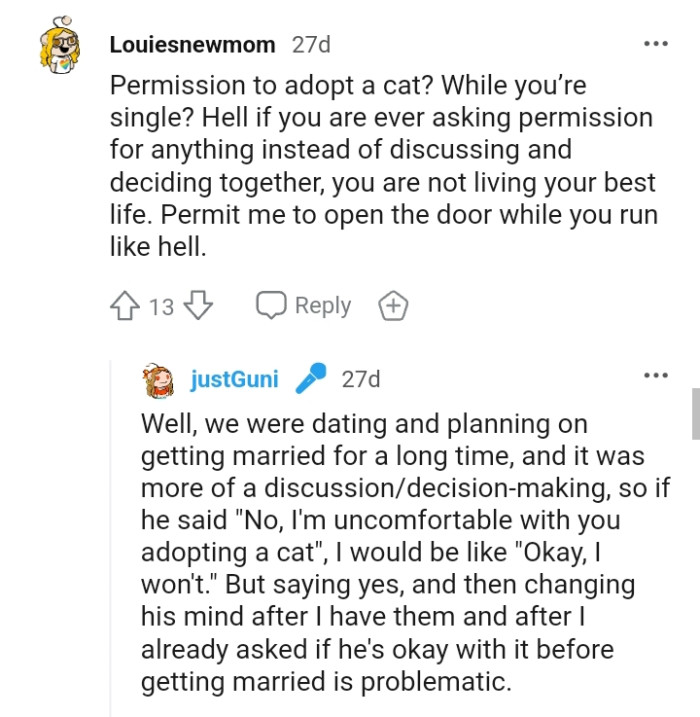
OP's partner can be upset without disrespecting her

It may also be beneficial for the couple to explore their communication patterns.
Couples therapy or relationship coaching can provide valuable insights into how they can improve their communication and conflict resolution skills.
Learning to express concerns constructively can significantly enhance their emotional connection and mutual understanding.
Investing time in personal and relational growth can strengthen their bond.
Revisiting Agreements and Expectations
Regularly revisiting agreements about responsibilities can help couples navigate changes in dynamics, particularly with pets.
Research indicates that relationships thrive on adaptability and ongoing communication about expectations.
By checking in regularly, couples can adjust to changing circumstances and prevent feelings of resentment from building up.
If he's the one visiting, then he should be the one taking precautions
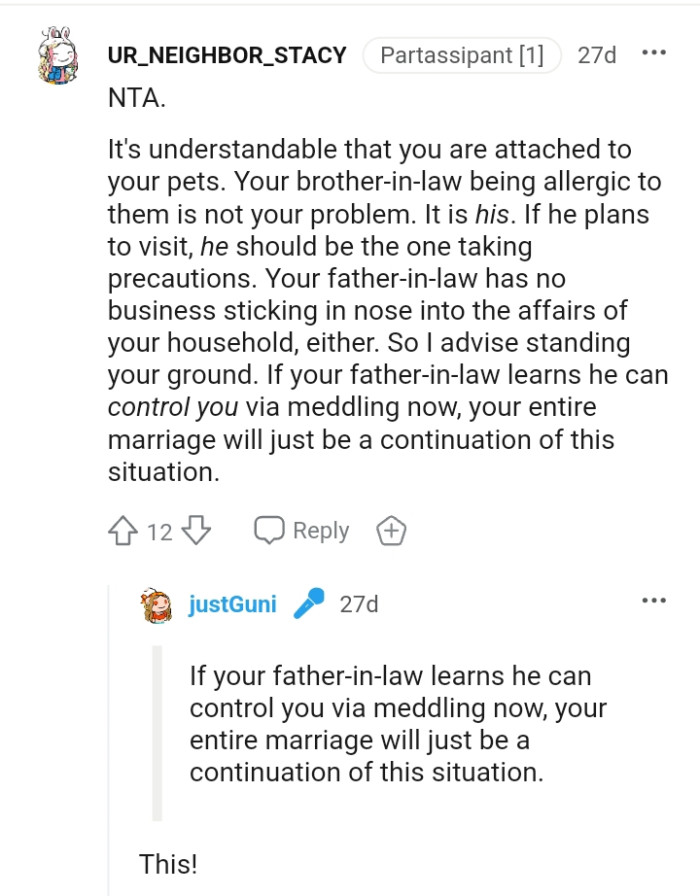
It sounds like the partner's controlling father is a trigger
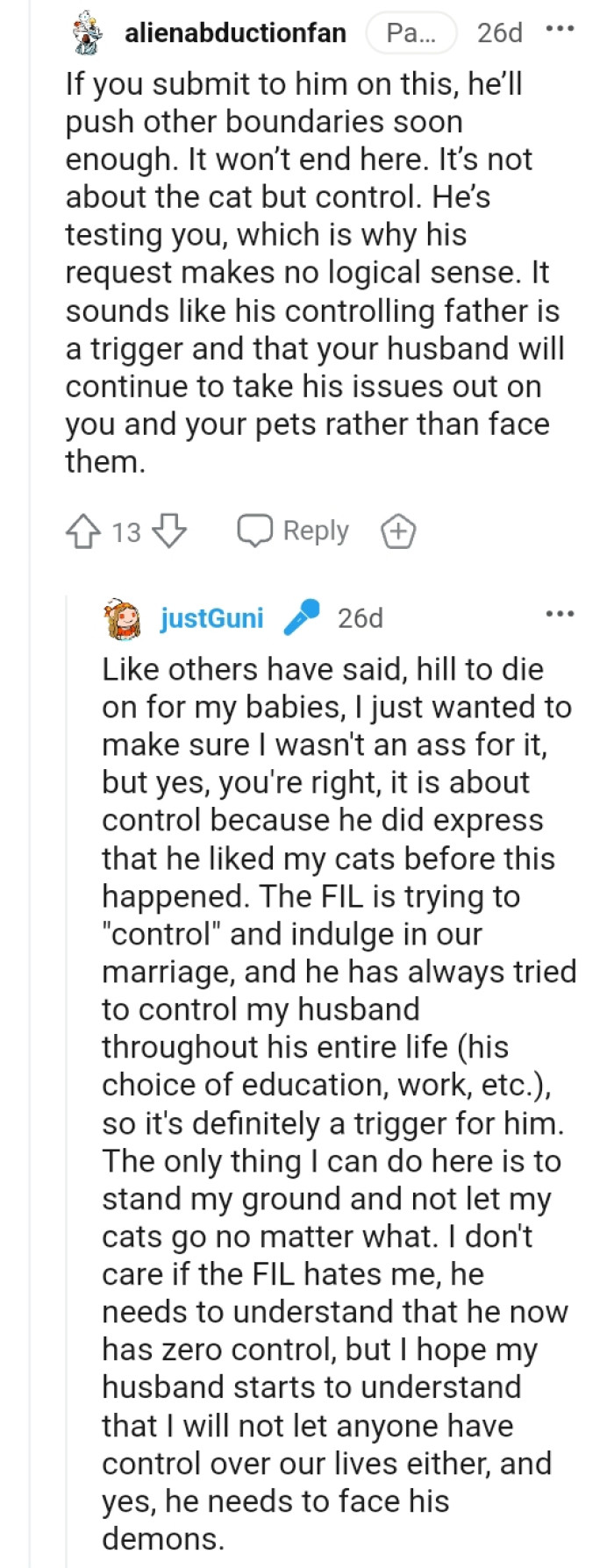
He can prepare for it or go get a life
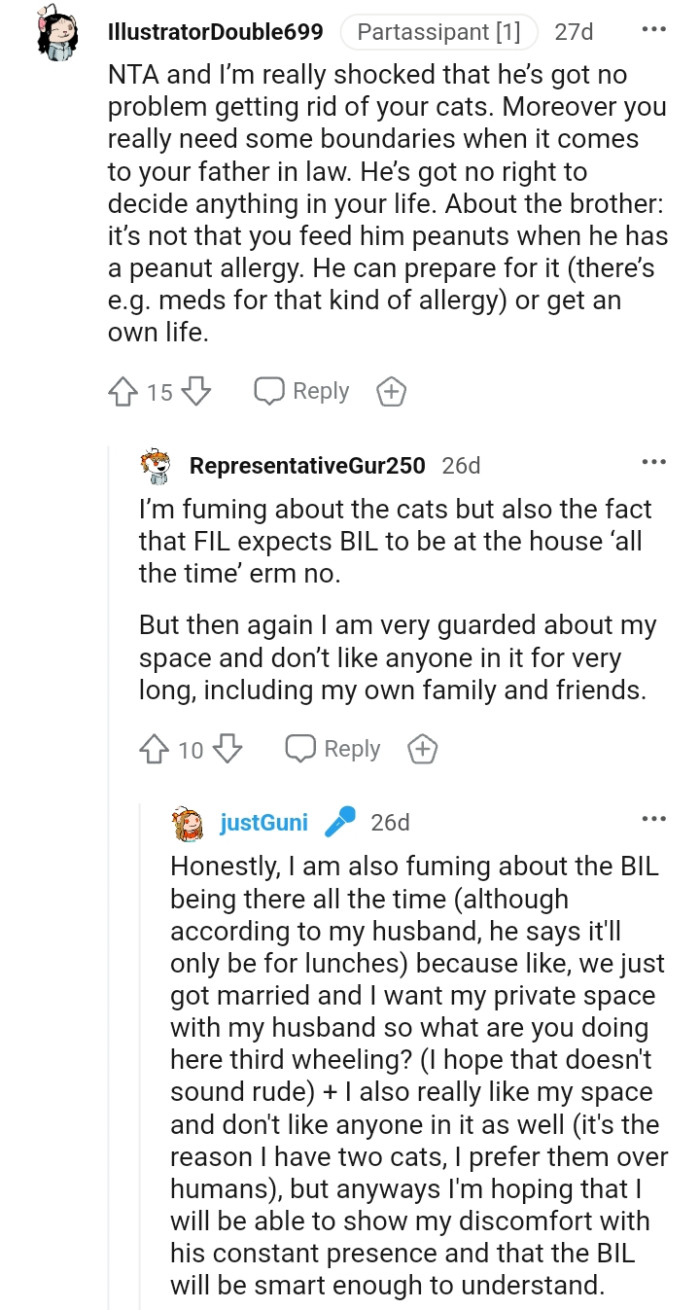
Navigating Conflict with Compassion
Conflict resolution specialists emphasize the importance of approaching disagreements with compassion and empathy.
When individuals feel heard and understood, they're more likely to engage in productive discussions and find solutions.
Research shows that compassion can significantly reduce hostility and foster collaboration, even in contentious situations.
Encouraging a compassionate dialogue about the cat's ownership can enhance the couple's emotional intimacy and trust.
This Redditor lists down what the OP can tell her husband
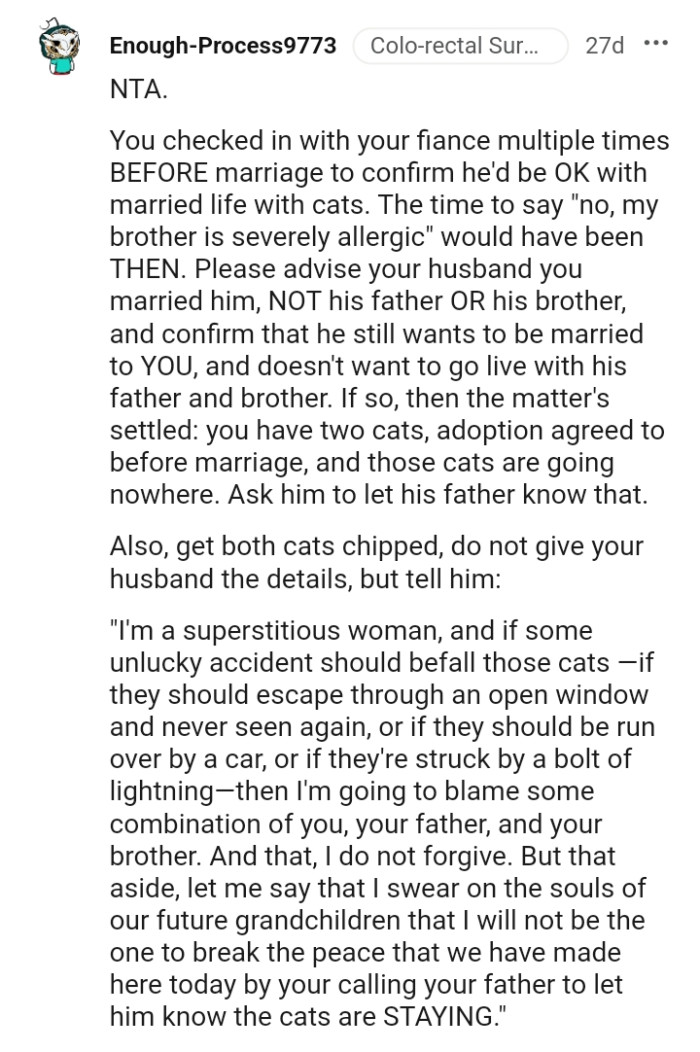
There is a reasonable solution if the OP cleaning is not enough
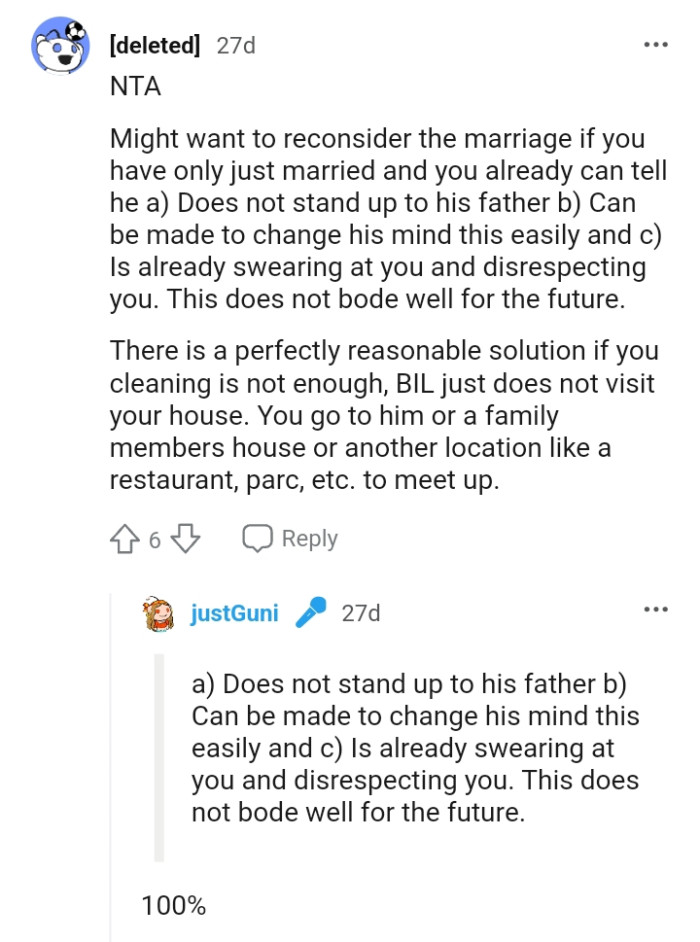
This Redditor's husband has severe cat allergies
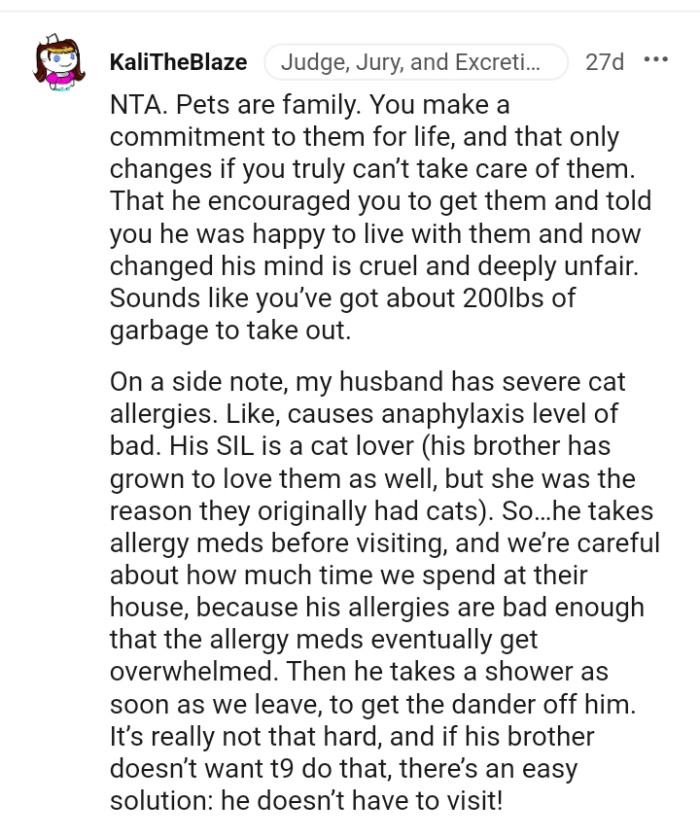
Finally, seeking outside support, like couple's counseling, can be an effective way to address ongoing conflicts.
A neutral third party can facilitate discussions about underlying issues and help the couple develop healthier communication strategies.
This approach can provide a safe space for both partners to express their feelings and work towards a resolution.
Utilizing counseling can often lead to more sustainable solutions in relationships.
This Redditor believes the brother is moving in

OP's FIL did plan on having BIL around them all the time
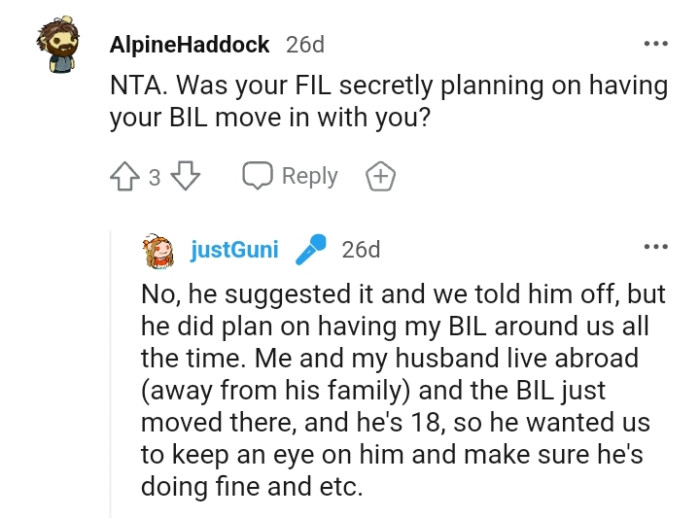
A hill to die on
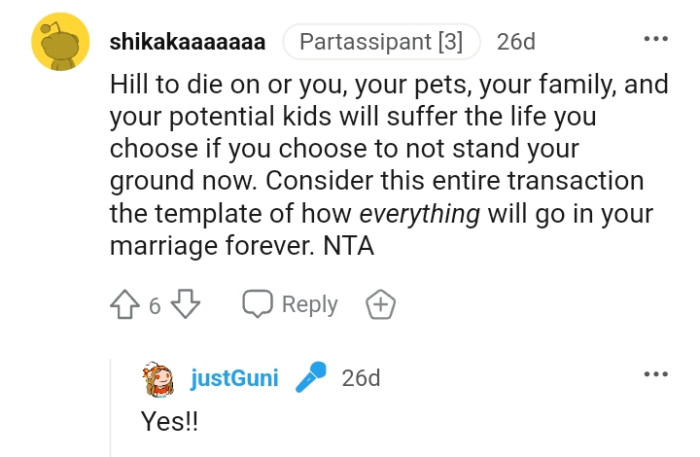
The truth is that an animal can enhance mental health by reducing stress, providing company, soothing pain, and acting as a therapy animal behind all of the warm hugs and purring. For many people who may encounter negativity in human interactions, the relationship developed with a pet offers dependability, encouragement, and happiness.
At the end, the OP was declared not the AH and that's a wrap!
Psychological Analysis
This situation reflects common challenges in relationships regarding shared responsibilities and commitments.
Recognizing these patterns and communicating effectively can pave the way for healthier interactions and greater understanding.
Analysis generated by AI
Analysis & Alternative Approaches
Understanding the complexities of commitment and responsibility in relationships can significantly improve relational dynamics.
As noted by Dr. Alexandra Solomon, relationship therapist: 'Effective communication and a willingness to adapt are crucial for sustaining healthy commitments.'
Ultimately, fostering an environment of openness and accountability can strengthen relationships and promote mutual respect.
Psychological Analysis
This scenario reflects the complexities of shared pet ownership and the emotional stakes involved. It's essential for both partners to feel heard and validated in their concerns about the pet. Engaging in open discussions and exploring each other's emotional attachments can foster greater understanding and resolution in their relationship.
Analysis generated by AI
Analysis & Alternative Approaches
Psychological insights reveal that effective communication and shared responsibilities are key components of harmonious relationships, particularly in shared pet ownership.
By fostering empathy and understanding, couples can navigate conflicts in ways that enhance their emotional connections while addressing practical concerns.
Psychological Analysis
This situation reflects the common challenges couples face regarding shared responsibilities, particularly when differing values come into play. The emotional attachment one partner has to pets can conflict with another's desire for a less demanding environment. Open dialogue about these feelings is essential for reaching a mutually satisfying resolution.
Analysis generated by AI
Analysis & Alternative Approaches
Exploring the psychological factors underlying relationship conflicts can provide valuable insights into navigating these challenges. Research indicates that effective communication strategies, such as those advocated by Dr. John Gottman, can help couples address their differences constructively. By fostering an environment of empathy and understanding, couples can work together to find solutions that honor both partners' needs.



